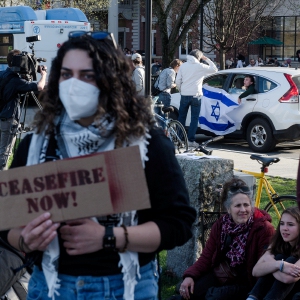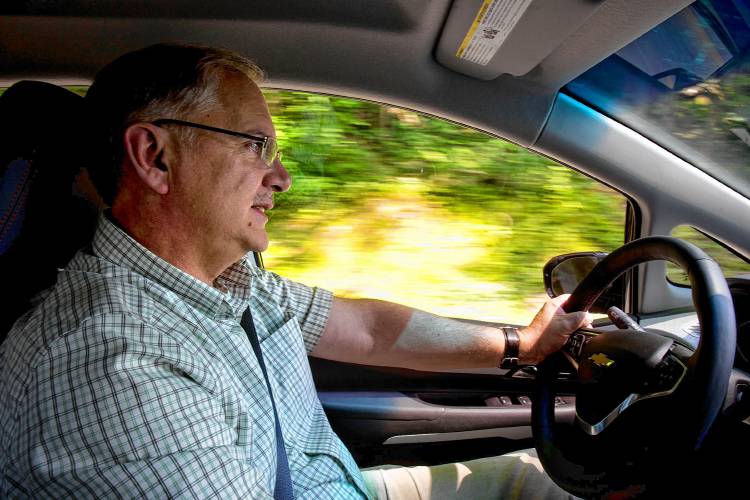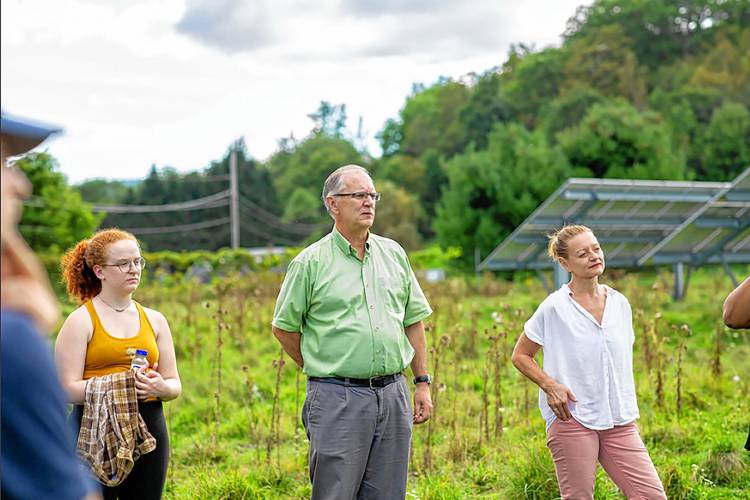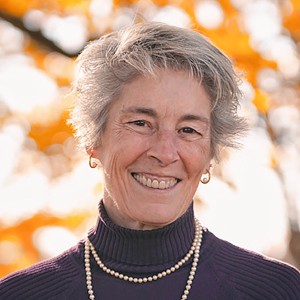A Life: For Kevin Jones ‘everything was geared toward helping other people succeed’
|
Published: 04-21-2024 5:31 PM
Modified: 04-22-2024 7:56 PM |
SOUTH ROYALTON — Nicole Lepre, a former student at Vermont Law and Graduate School, told her professor Kevin Jones that she was interested in some of the more nuanced policy related to electric vehicles. “Then Kevin was like, ‘Well, why don’t you help me get more EV chargers in the parking lot?’ ” Lepre said.
Lepre graduated with a master’s degree in energy regulation and law in 2019, after which Jones, director of the school’s Institute for Energy and the Environment, promptly helped her secure a job in the transportation electrification field.
Gifted with the communication and heart that the clean energy transition demands, Jones could make people care about — and take action on — some of law’s densest, most rapidly evolving material.
He was a devoted professor, Lepre said, but he was also “like a coworker and a boss.” Getting her master’s degree under him felt like “having a real job” rather than just being in school, she said. “He gave us real experiences and was always willing to help us find projects that were relevant to what we’re working on. Then, he took those projects really seriously.”
In January, standing before his classroom teaching a course titled “Environmental Economics,” Jones, a 61-year-old resident of Chittenden, Vt., suffered an aortic aneurysm, collapsed and died. His death tore a gaping hole in the law school and the energy policy sector writ large.
“The way Kevin died was tragic, and it added a whole crushing element to an already very sad loss,” said Jennifer Rushlow, a dean at the law school, at Jones’ memorial service in February. “But I don’t want to focus on that because Kevin was not a tragic person.”
Originally from Proctor, Vt., Jones received a master’s degree in public affairs from the University of Texas and a doctorate in environmental management and policy from Rensselaer Polytechnic Institute in Troy, N.Y. He then rose quickly through the energy sector.
The director of power market policy for the Long Island Power Authority and a former director of energy policy for the city of New York, Jones was at “the center of the transformation of the electric power industry in the Northeast,” his school bio reads.
Article continues after...
Yesterday's Most Read Articles
 Dartmouth moves swiftly to stymie demonstration, leads to 90 arrests
Dartmouth moves swiftly to stymie demonstration, leads to 90 arrests
 Dartmouth graduate student-workers go on strike
Dartmouth graduate student-workers go on strike
 At Dartmouth, hundreds protest ongoing war in Gaza and express support for academic freedom
At Dartmouth, hundreds protest ongoing war in Gaza and express support for academic freedom
 Art Notes: City Center Ballet celebrates 25 years
Art Notes: City Center Ballet celebrates 25 years
In his next chapter, Jones was devoted to ensuring the industry continued to transform.
After returning to Vermont, Jones helped establish the law school as a leader in energy law and nurtured an army of innumerable energy-focused lawyers and environmental advocates.
“The second he walked in the room, you could see that he had something special that could be put to use,” said Don Kreis, who served as the institute’s assistant director from 2008 to 2012 and who interviewed Jones for a position as a fellow at the school in 2010.
Jones, by training and inclination, was an economist. “I really think that law students and people who think about law and public policy in (the) energy realm need to grapple with economic issues,” said Kreis. “Here was Kevin, volunteering to be resident economist for all of us. That was a very enticing proposition.”
And while Kreis “liked” his students, Jones “loved” his, Kreis said. “He was so devoted to not just teaching them and making sure they learned what they needed to learn, he was committed to planting them in careers where they could do awesome things.”
Jones had a really “earnest personality,” Kreis said. “He was very easy-going and mild mannered on the surface but what becomes obvious when you talk with him is that beneath all that lurked a pretty rigorous set of values and commitment to honesty.”
It came down, he said, to a commitment to “no B.S.” and “truth-based public policy.”
In 2014, Jones launched the law school’s Energy Clinic, which helps students learn the ropes of the energy sector by pursuing a local project.
In 2018, for example, the group helped launch the first resident-owned community solar array in New Hampshire at Mascoma Meadows, a Lebanon mobile home park.
“Everything was geared toward helping other people succeed, and that’s where he found his own success,” said Mark James, who worked under Jones for a decade and was named the director of the institute after his death. “Nothing gave him more joy than to announce a recent graduate had been hired.”
As he expected of his students, Jones practiced what he preached. He and his partner, Rachel Levin, lived in a house affixed with solar panels long before anyone could guess that they would later be rewarded with a tax credit.
“He was one of the first people I knew, actually, to have solar panels,” James said. “He had them as soon as he could. And I never saw him drive a strictly gasoline vehicle. What he taught was how we get to a clean energy system. He lived that same way, too.”
In the winter, Jones often skied in the morning before making the hour-long trek to the law school.
He had something to look forward to in his return as well.
A devoted owner of sheep dogs, “they got his attention in the morning before he came to campus, and they were waiting for him to come home everyday,” James said.
James was tasked with going through Jones’ books after his death. “I can see this history of his being aware of environmental issues, and their connection to our energy system,” he said.
Jones had books on climate change dating back to the 1980s, before the phrase was even in most people’s lexicon.
At the time of his death, Jones had just begun diving into issues of offshore wind and transportation electrification, James said. “There was just so much more that he wanted to do.”
Last week, the law school established the Kevin B. Jones Fund, meant to disburse money to support energy students in pursuing academic and professional development opportunities. The proof of his commitment to past students is beginning to bear fruit, James said.
“In his 13 years here, he kick-started a lot of people down these paths,” he said. “We’re at this point now where we can see the initial generations carrying Kevin’s light forward.”
Kreis, now the New Hampshire consumer advocate, said Jones “practically ordered” him to hire his former student, Michael Crouse: “Of course, because Kevin was such a credible source of help, I followed his orders. And I’ve been very pleased.”
Crouse, these days a staff attorney in Kreis’ office, met Jones on a prospective students tour of the law school in 2018.
Bumping into Jones in the hallway “turned into him inviting me out for an extra day, to sit in on meetings and really see what they do at the law school,” Crouse said.
Before heading to VLGS, Crouse was a sales associate for Universal Orlando resort in Florida. But he’d always had a deep-seated interest in environmental issues. “Kevin took someone with little to no background in energy law and turned me into the professional I am today,” he said.
After Jones’ death, Crouse took to a tribute page for him managed by the law school, where scores of students have recounted similar interactions with Jones. They had little experience in law and, due in large part to Jones’ mentorship, are now leading the charge in environmental legal advocacy.
“While my heart breaks with your passing, I find solace in learning of all the lives you have changed for the better,” Crouse wrote.
“Thank you for making a difference in my life.”
Frances Mize is a Report for America corps member. She can be reached at fmize@vnews.com or 603-727-3242.




 Colby-Sawyer names interim president
Colby-Sawyer names interim president
